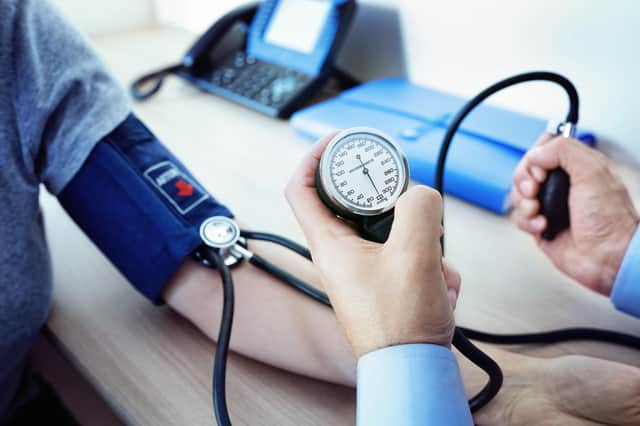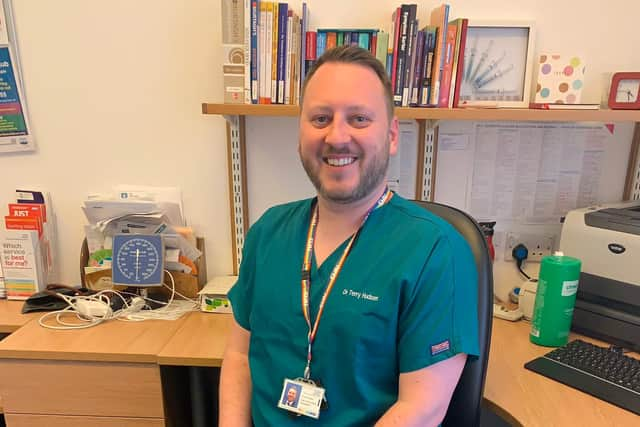GP surgeries ‘open for business’ despite coronavirus, Sheffield health bosses say


GP Terry Hudsen, the chair of Sheffield’s NHS clinical commissioning group, spoke to the Star after data was revealed that showed there had been a 58 per cent fall in cancer referrals from 835 a week before the pandemic began to 355 now.
Dr Hudsen also said that there were also concerns that pregnant women were missing ante-natal appointments, children were not getting vaccinations and those with mental health problems were not getting the support they needed.
Advertisement
Hide AdAdvertisement
Hide AdHowever, he said that the NHS in Sheffield had coped ‘incredibly well’ with the coronavirus pandemic, and that his main message was that GP practices in the city were still ‘open for business’ for anyone with any health problem.


He said: “The number of people with covid is starting to go down slowly and our health service has coped incredibly well with the number of people with the infection.
“But as those numbers go down we are looking to the future and thinking about how do we begin to get some of those routine services up and running again.
“People are frightened by covid, they are frightened to come to a GP surgery or frightened to leave their house because of a risk of infection.
Advertisement
Hide AdAdvertisement
Hide Ad“And there is probably a large number of people who feel that covid is such a big thing for the health service at the moment that they don’t want to burden us with something they live with every day.”
“But GPs are the front door to the NHS and people’s first port of call and what we really don’t want is for people with long-term conditions like COPD or diabetes to neglect their health.”
Dr Hudsen said that while GP services have remained open throughout the crisis, people going back may see some changes in the way they access services.
He said: “The traditional way of attending the GP has been booking an appointment and then attending in person but we have changed - pretty much overnight - to working in a different way.
Advertisement
Hide AdAdvertisement
Hide Ad“Lots of things we are able to deal with remotely so many practices have started to become more innovative in doing things like video consultations and a lot more work over the phone.
“When someone needs to be seen by a doctor or nurse in primary care, we will absolutely see them face to face.
“But the Government message is to stay alert, so practices have adapted their infection control policies to keep people safe.”
As well as long-term health conditions, Dr Hudsen said there was also evidence people may be putting off getting checked out for possible cancers.
Advertisement
Hide AdAdvertisement
Hide AdHe said: “We want to hear from patients when there is something that might be indicative of a more serious problem like a new lump, a changing mole or bleeding in their urine or stool.
“These are things that clearly could very important and life-changing effect so we absolutely don’t want people to feel like they are a burden or that the service isn’t here for them.
“What we do know about lots of cancers is the longer you leave them, the more difficult they are to effectively treat so that is a very big concern for us.”
In terms of children, Dr Hudsen said there was also evidence that pregnant women were not attending ante-natal appointments as often as they should and that children were missing out on vaccines.
Advertisement
Hide AdAdvertisement
Hide AdHe said: “Monitoring in pregnancy is really important so it is essential that pregnant women continue to come to ante-natal appointments and to seek advice from their midwives or maternity teams.
“And we are also seeing a slight dip in the number of children being brought in for routine vaccinations which protect against serious or sometimes potentially deadly illnesses.
“As we see some of the social distancing measures become more relaxed then the risk of those infections we vaccinate against will become amplified.”
And as well as concerns over people’s physical health, Dr Hudsen said the impact of the coronavirus pandemic on mental health in the city was also a concern.
Advertisement
Hide AdAdvertisement
Hide AdHe said: “In certain parts of Sheffield we are seeing an increase in people coming forward with difficulties around their mental health either as a result of covid or some of the things around it like people losing their jobs. It is really important that continues.
“And we also have a number of people with very serious mental health problems such as bipolar disorder or schizophrenia, and like any long-term condition it is really important that we do out best to try to keep that condition as controlled as possible.
“There is lots of additional support that has been set up from mental health services at the moment which can be accessed either through people’s GPs, the Sheffield Flourish and mental health trust websites, and a 24-hour helpline.”